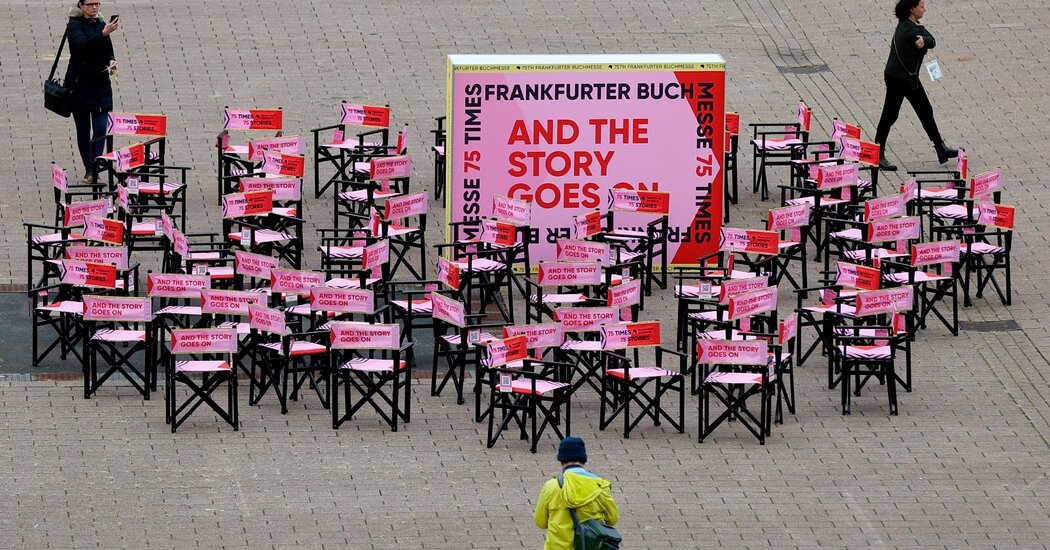
Heated debate over the conflict overshadowed the 75th gathering of one of the world’s largest literary events.
The Frankfurt Book Fair, one of the largest literary events in the world, began this week under a cloud of anger and recrimination after the cancellation of an event honoring a Palestinian author — a decision that set off a heated debate about the role of literary and cultural organizations in times of strife.
Hundreds of authors and publishers signed a letter in protest over the treatment of the Palestinian novelist Adania Shibli. Several publishing organizations from the Middle East and Asia withdrew from the fair. And during the fair’s opening ceremony on Tuesday evening, the Slovenian philosopher Slavoj Žižek made a speech in which he condemned the decision as “scandalous,” and was interrupted repeatedly by a local politician, the antisemitism commissioner of the German state of Hesse.
“I’m not only proud to be here,” Žižek said. “I’m also a little bit ashamed.”
The controversy erupted before the fair even began. Shibli was supposed to receive a prize at Frankfurt given “to women writers from the Global South” for her novel “Minor Detail,” which begins in 1949 during the clashes between Israeli and Arab forces. The book includes an account of the gang rape and murder of a Bedouin girl by an Israeli Army unit.
Litprom, the organization that manages the prize, announced last week that it was canceling the ceremony in Shibli’s honor. (Litprom is funded by the Frankfurt Book Fair and the German government.) A panel with Shibli, who divides her time between Jerusalem and Berlin, and her German translator was also canceled.
“In light of the terror against Israel, Litprom is looking for a suitable format and setting for the event after the book fair,” Juergen Boos, the director of the book fair, said in a statement explaining the decision. In the same statement, Boos said that following the attacks in Israel, the fair would “give Israeli and Jewish voices additional time on our stages.”
“Minor Detail” has drawn praise from critics and prize committees, and was nominated for both the International Booker Prize and the National Book Award. Barbara Epler, the publisher of New Directions, which released an English translation of the book in 2020, said the canceled event was especially troubling because Shibli’s novel is a condemnation of the endless cycle of violence in the region.
“This isn’t someone who condones violence in any form,” she said of Shibli. “She’s a voice for peace and understanding.”
Others have criticized the book and its selection for the award. A German judge for the prize, Ulrich Noller, resigned from the jury this summer when the book was chosen. A literary critic at Taz, a left-leaning German newspaper, said the book portrays “the State of Israel as a murder machine.”
Reached by email, Shibli said that she was unable to comment because she felt “truly lost for words with what’s been unfolding in Palestine/Israel.” In a previous statement to The New York Times, Shibli said it was alarming to see “populism attempting to take its hold on literature.”
“Literature cannot be in the grip of one group, not when it forges an intimate link with every reader,” she wrote.
In the open letter, which was signed by hundreds of writers, including the Nobel laureates Olga Tokarczuk, Abdulrazak Gurnah and Annie Ernaux, members of the literary community denounced the cancellation of Shibli’s events. “The Frankfurt Book Fair has a responsibility, as a major international book fair, to be creating spaces for Palestinian writers to share their thoughts, feelings, reflections on literature through these terrible, cruel times, not shutting them down,” the letter states.
Among the organizations that withdrew from the fair was the Indonesian Publishers Association, which said that “siding with Israel while forgetting the suffering of the Palestinian people is like reading only one book to feel like you understand the whole world.”
In an email on Thursday, the organizers of the fair emphasized that the award to Shibli was never in question, only that they had planned to postpone its presentation until after the fair.
“To dispel false reports and misunderstandings that may have arisen in the past hours: Millions of innocent people in Israel and in Palestine are affected by this war, and our sympathy goes out to all of them,” the organizers said in an email on Thursday. “We truly hope that ways can be found to bring them out of this violence.”
Of the 200,000 attendees expected at the fair, and exhibitors from nearly 100 countries, the organizers said, they had received very few withdrawals.
Daniel Simon, the publisher of Seven Stories Press and a signatory on the open letter, said that emotions were high at the opening ceremony, but the conversation seemed to have been “necessary and constructive.”
“This kind of learning from each other, taking in what other people are saying,” Simon said, “this is what we’re here for.
The debate over the role of writers in times of conflict is likely to remain a topic throughout the fair, which runs through Sunday. This coming weekend, Salman Rushdie, the acclaimed novelist and free speech advocate who was attacked at a public event last year, will receive the fair’s peace prize and give a public talk.
When asked about the current war between Israel and Hamas, and whether literature could help foster understanding, Rushdie said that while writers cannot stop a war, they can help by documenting human suffering.
“What writers can do, and what they are doing, is to try and articulate the incredible pain that many people are feeling right now,” Rushdie told a German news media outlet covering the fair. “And to bring that to the world’s attention.”
Christopher F. Schuetze contributed reporting.
